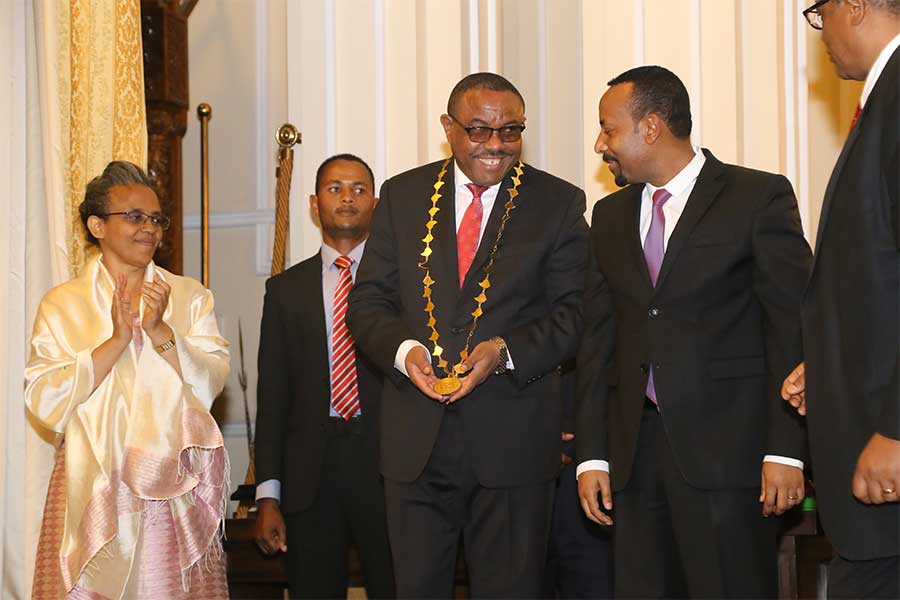
Viewpoints | Jan 25,2020
Mar 23 , 2019
By Hintsa Andebrhan
I remember reading an article regarding Former Prime Minister Hailemariam Desalegn when he first came to power seven years ago. It was an interesting piece that told us about his rapidly evolving political career and achievements. It was a good choice by the EPRDF, I thought, at the time, and neither was there much public indignation that he was to hold the highest public office in the country.
He was an academic, and there had been a smooth transfer of power within the party. There were reasons to believe that the party led by its new chairman would begin to chart a new political economy. Of course, even in death, Prime Minister Meles Zenawi cast a heavy shadow. As the economic situation evolved and as politics was revolutionalised, for better or worse, through social media, the party and Hailemariam stuck to their old guns. Therein lay the failure that led to the public outcry that gave us Prime Minister Abiy Ahmed (PhD).
The circumstances with which Abiy became Prime Minister could not be more different, and neither can there be drawn a similarity for the political problems he faces. He is walking on a much thinner rope carrying a much less reliable balancing pole. No wonder we are constantly in suspense.
It is hard to argue that Abiy has a better hold of the EPRDF than Hailemariam, given the unprecedented tensions between the member parties and the frequency with which middle and lower level cadres have begun to digress from the party line. There was a time when it was believed that a strong public mandate could replace the networks provided by the party to exercise its rule. There is less and less consensus about this as public support seems to be waning.
It does not help that this is a nation with a trove of political, economic and even historical baggage. Abiy is the Prime Minister of a nation where unemployment, partisanship and land disputes are flaring to the point that it is hard to believe that it can be sustained for so long.
No doubt, the Prime Minister has charisma and charm that cooled off the various forces in the country. It turned out though that Abiy was unable to deliver on much but flowery words, which stress to us that unity, justice and democracy are crucial.
Indeed, reforms being taken to ensure that the nation has a free and fair election, in addressing challenges of the justice system and the media landscape are commendable. But there is a significant deficit in clarity of vision by Abiy’s administration.
What are citizens to think when positive steps toward democracy are followed by actions that persuade us what is taking place is a repeat of what past regimes had done?
Leadership is not about power but responsibility to look after citizens and their wellbeing. It is impossible to keep everyone happy, for every whim and interest cannot be fulfilled. As a result, leaders choose a policy, ideology and strategy they believe is just and fair to the collective good of citizens. Sticking to these lines and doubling down through the lines of communication is necessary.
This is not to suggest that the government should be solely charged for the perplexing political quagmire the nation is in currently. Opposition parties are clearly failing us, and their input in politics seems to have done more damage than good at this point - a development few would have seen coming a year ago.
But it is unfortunate to see the administration remain equivocal over matters that are becoming reasons for contention. Matters that are leading to the displacement and loss of innocent lives should never be up for discussion. There are matters that the administration should not take time to address, or apply the rule of law selectively. These are exactly the kind of problems that have led to many of the country’s current problems in the first place.
PUBLISHED ON
Mar 23,2019 [ VOL
19 , NO
986]


Viewpoints | Jan 25,2020

Commentaries | Aug 08,2020

Sunday with Eden | Jul 08,2023

Editorial | Apr 03,2021

Commentaries | May 25,2019

Viewpoints | Jan 05,2019

Radar | Oct 31,2020

Agenda | Oct 24,2020

Fortune News | Nov 23,2019

News Analysis | Jan 05,2020

My Opinion | 131974 Views | Aug 14,2021

My Opinion | 128363 Views | Aug 21,2021

My Opinion | 126301 Views | Sep 10,2021

My Opinion | 123917 Views | Aug 07,2021

Dec 22 , 2024 . By TIZITA SHEWAFERAW
Charged with transforming colossal state-owned enterprises into modern and competitiv...

Aug 18 , 2024 . By AKSAH ITALO
Although predictable Yonas Zerihun's job in the ride-hailing service is not immune to...

Jul 28 , 2024 . By TIZITA SHEWAFERAW
Unhabitual, perhaps too many, Samuel Gebreyohannes, 38, used to occasionally enjoy a couple of beers at breakfast. However, he recently swit...

Jul 13 , 2024 . By AKSAH ITALO
Investors who rely on tractors, trucks, and field vehicles for commuting, transporting commodities, and f...

Jul 5 , 2025
Six years ago, Ethiopia was the darling of international liberal commentators. A year...

Jun 28 , 2025
Meseret Damtie, the assertive auditor general, has never been shy about naming names...

Jun 21 , 2025
A well-worn adage says, “Budget is not destiny, but it is direction.” Examining t...

Jun 14 , 2025
Yet again, the Horn of Africa is bracing for trouble. A region already frayed by wars...

Jul 6 , 2025 . By BEZAWIT HULUAGER
The federal legislature gave Prime Minister Abiy Ahmed (PhD) what he wanted: a 1.9 tr...

Jul 6 , 2025 . By YITBAREK GETACHEW
In a city rising skyward at breakneck speed, a reckoning has arrived. Authorities in...

Jul 6 , 2025 . By NAHOM AYELE
A landmark directive from the Ministry of Finance signals a paradigm shift in the cou...

Jul 6 , 2025 . By NAHOM AYELE
Awash Bank has announced plans to establish a dedicated investment banking subsidiary...